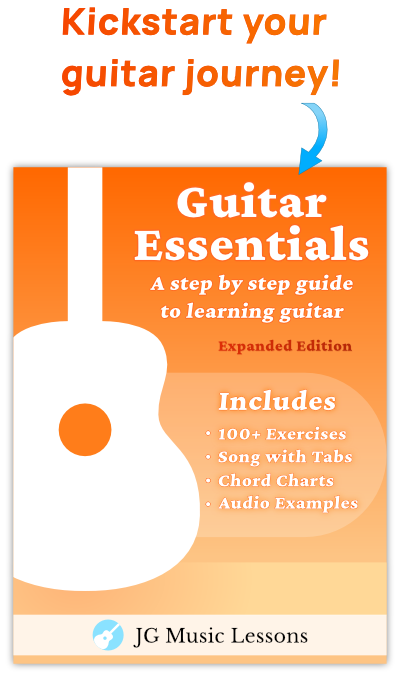Whether you have no experience playing the guitar or have been trying to learn for some time, you may have asked yourself if it’s possible to get better without taking lessons?
The short answer is, yes, you can teach yourself guitar but in this post we cover 7 factors to consider whether it’s better to do it on your own or get help with music lessons.
Let’s get right into it.
1. You don’t know what you don’t know
If you are just starting, oftentimes it can be difficult to know in what order you should learn new material. Even if you do have access to many resources, it can be confusing trying to figure out what you should prioritize depending on your current level.
When you’re on your own, you also don’t know if you’re getting accurate information so it takes a lot of trial and error to find the right resource for you. Also, you don’t want to be falling into habits to avoid when learning guitar.
The benefit of having a good teacher is that they have gone through all of that process already and they can help you identify and refine the areas in your playing that you might have not even been aware of.
2. Having trouble structuring the learning process
When learning on your own, it’s easy to get caught up watching random videos only to find out you are having trouble understanding how the material relates to each other. Yes, you can find good information to learn but if it’s not catered to your specific needs and goals, it can be a frustrating and longer process than it needs to be.
Working with a good teacher can provide a structure for learning your instrument. They should be able to identify your skill level and help you grow based on when you’re currently at. A good teacher will help expedite the learning process by suggesting the next best thing for you as opposed to you spending your time hoping you find the right information.
For now, you may want check out these tips on what to practice on guitar.
3. Are you being efficient with your practice time?
I would suggest to think about how you are using your time to practice instead of how much time you spend on your instrument.
When you don’t know what to practice next, you could be wasting hours without making effective progress. You can be wasting a lot of time working on the wrong material and find out that you aren’t able to practically apply it. This is where having a teacher can guide you to practice smarter not harder.
Consider checking out this 7 minute guitar practice session to help you make efficient progress on your instrument.
If you take the extra time to research and try out different resources to help you grow, you can find something that works for you. However, you can cut out unnecessary time down by working with a teacher who can equip you on a good learning path that is personalized for you.
4. Getting feedback for your progress
Perhaps you have already found some resources that have helped you learn guitar up to this point. Despite trying to learn on your own for some time, do you ever lack the confidence to share with others? One reason you can feel that way is that you may have never been able to get feedback as you were learning.
When you’re on your own, there’s no one to tell you if you’re headed in the right direction. Also, you don’t want to realize further down the line that you’ve picked up bad habits in your technique. Of course, these details can be adjusted as you learn on your own but why not have some tell you earlier than later when it can get harder to change the way you’ve been accustomed to doing things.
Getting a good teacher’s feedback can bring you back on the right track as well as give you the encouragement and motivation to keep learning on your instrument.

5. Consider the cost
The cost of music lessons can one of the biggest reasons that can hold you back because you are trusting that a teacher will have your best interest in mind. You can save a lot of money by learning on your own but it does come at a cost which is the time it can take for you to learn effectively.
Everyone has a different standard of what is a reasonable price to pay for a skill they want to learn. If you do find someone you want to work with, you can always ask to take a lesson before committing for a longer time. If you’ve never tried doing so, taking one lesson can help you decide if it’s right for you to continue. You’ll be able to get a sense of the teacher’s methods and resources they provide for you.
Not all instructors will teach the same even if the price is similar, so it’s best to ask questions and let them know your situation. Figure out if the lessons will be catered to your specific needs and goals. These are good things to ask and consider when choosing to work with someone.
6. Sticking to a learning plan
Whether you decide to learn on your own or work with a teacher, it’s important to understand that learning the guitar like anything else takes time to effort to improve. A teacher will guide you and motivate you in the process but ultimately, you have to do your part to be able to develop your skills.
If you’ve already tried learning on your own, take an assessment of the progress you’ve made and determine if you are happy with the results. It would be great if you’re content with your learning journey but if not, then switch your current approach to be able to see improvements.
Whether you’re a self motivated learner or decide to get guidance from a teacher, either way, the only way to get better at your instrument is to stick with the process to see the fruit of your labor. The biggest difference is that having someone to work with you can provide encouragement, structure, accountability and make the learning process more enjoyable.
7. Finding what works for you
Everyone learns differently and it helps to know what works best for you. What methods have you found to be most helpful in learning guitar? For example, check out these 6 tips to help you improve your guitar playing.
Also, think about what some of your goals are when learning guitar. Some people they simply want to learn their favorite songs, learn to improvise or be able to play by ear. As you clarify what these goals are, you will make a better decision to either learn guitar on your own or go with personalized lessons.
Wrapping up
We all want to make progress and realize the musicals goals we’ve set out for ourselves. So whichever way you try to get there whether on your own or working with a teacher, I hope this post has helped you consider the different factors that come into play when making these decisions.
📘 Get the free guitar practice guide here!
All the best on your musical journey,
JG
Original photo by Lacey Williams on Unsplash

